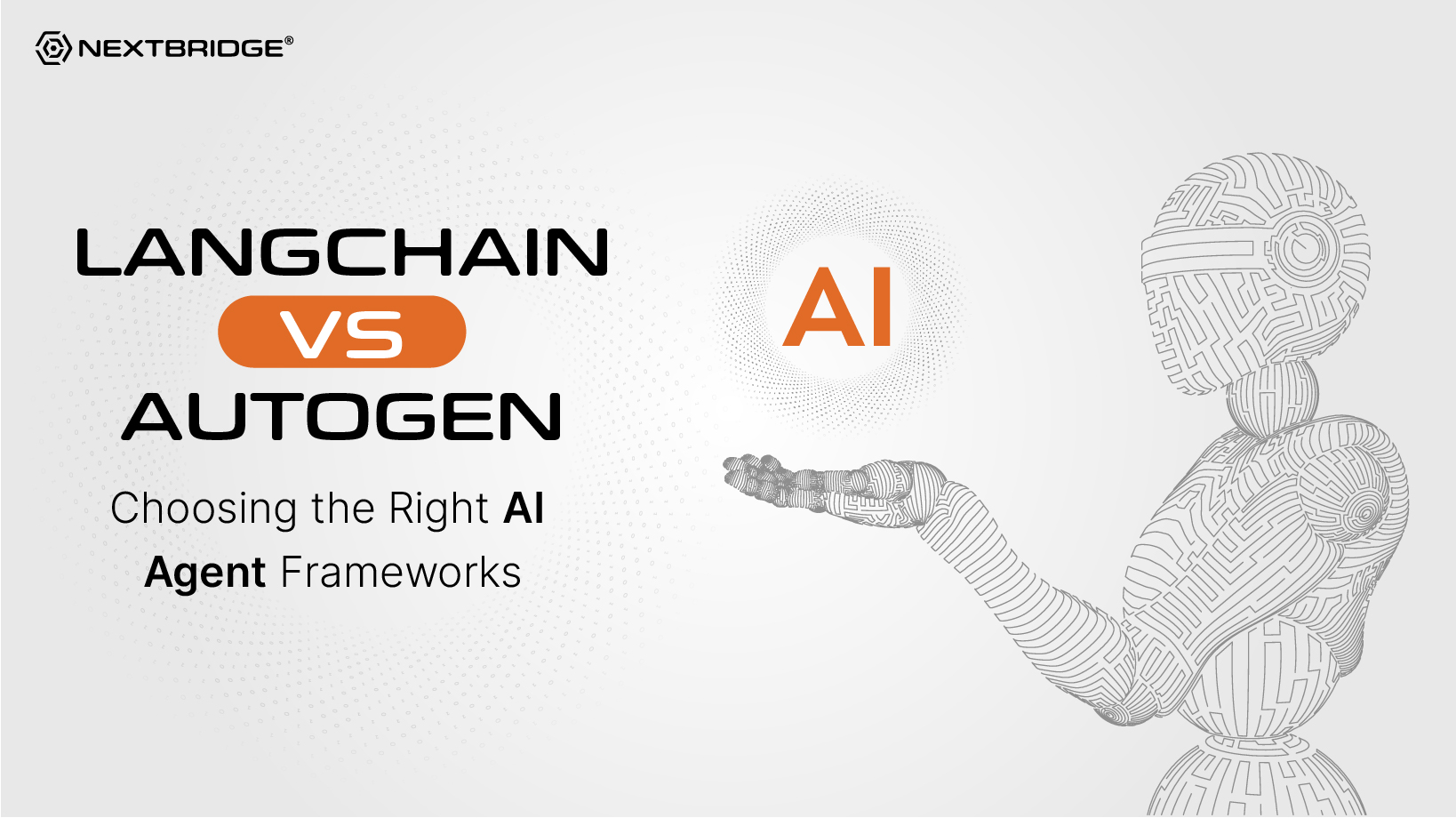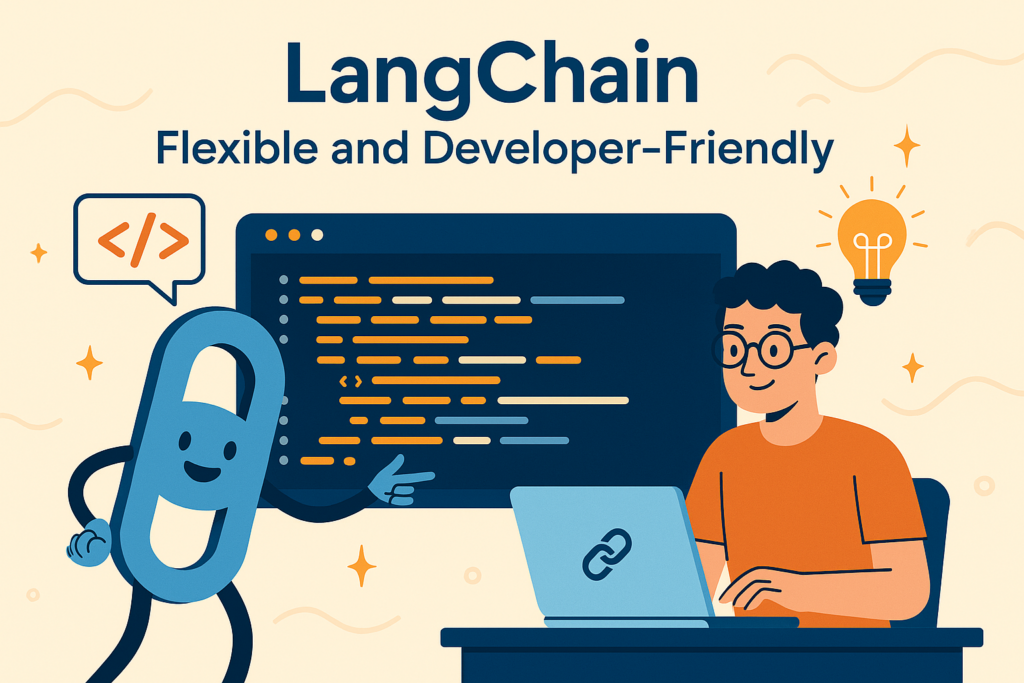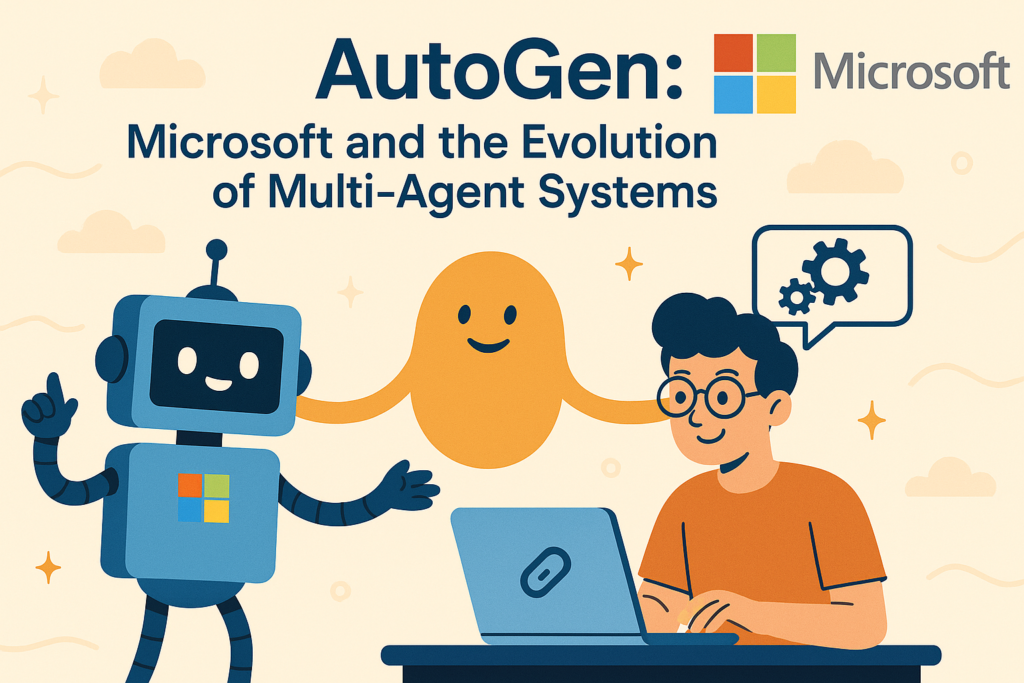 Back to all articles
Back to all articles
Blogs
LangChain vs AutoGen: Choosing the Right AI Agent Frameworks


AI frameworks have transformed the way we interact with AI, but their abilities are often limited when it is the matter of complex and multi-step tasks. This is where multi-agent systems come into action. They enable individual agents to collaborate, solve complicated problems, and achieve predetermined goals.
Two prominent and the best AI frameworks that lead this domain are LangChain and AutoGen. These AI agent frameworks have refined how developers build, scale, and automate AI agents practically.
In this blog, we will compare the capabilities of LangChain and AutoGen and contrast their strengths, weaknesses, and applications.
What are AI Agent Frameworks?
AI agent frameworks provide the core structure needed to build smart agents that use models like GPT-4, Claude, and Gemini to plan, reason, and act independently.
AI agent frameworks act as the foundation for building intelligent agents that can think, plan, and perform tasks on their own using an LLM agent framework like GPT-4, Claude, and Gemini. These frameworks perform the following tasks:
- Handling and organizing prompts
- Storing and recalling memory
- Using tools and APIs for integration
- Enabling communication between multiple agents
- Connecting with outside systems
Both LangChain and AutoGen are popular in Python AI frameworks and are changing the way we think about automation and intelligent assistants.
What is Agentic AI?
Agentic AI are intelligent systems that not only exhibit goal-directed behavior, but also organize multi-step actions, and communicate with others. By doing so, they make independent decisions. Rather than waiting for instructions, these systems operate without constant human input.
Talking about AutoGen vs LangChain in terms of agentic AI, AutoGen features independent task execution while LangChain offers a more guided approach. If you are planning to develop AI agents that can operate with minimal guidance, you are entering the world of agentic intelligence.
LangChain vs AutoGen: A Quick Comparison
Now that we have discussed what are AI agent frameworks are, let’s understand how similar and different LangChain and AutoGen are. Here is a quick summary:
| Feature | LangChain | AutoGen |
| Language | Python | Python |
| Best For | Fast prototyping | Enterprise-scale agentic solutions |
| Primary Focus | Modular agent chaining | Autonomous multi-agent collaboration |
| Ease of Use | Beginner-friendly | Intermediate to advanced |
| Multi-Agent Capability | Limited | Advanced |
| Community Support | Strong | Rapidly growing |
| Use Cases | Chatbots, RAG apps, assistants | Research, automation, reasoning |
LangChain: Flexible and Developer-Friendly
LangChain is among the most adopted AI frameworks, especially for individual developers, teams, and startups who aim to prototype AI agents quickly. It features an easy-to-use interface that links LLMs with tools, APIs, memory modules, and documents.

Key Benefits:
- Designed for Python AI frameworks developers
- Ideal for creating workflows from basic to mid-level agents
- Smooth integration with OpenAI agents
- Comes with modular features like agents, tools, chains, and memory.
- Widely used by developers to create free AI systems and MVPs
Use Cases:
- Answering questions from documents directly
- AI-powered assistance for writing and debugging code
- Retrieval-Augmented Generation-enabled models for better responses
- Lightweight AI agents examples for support and sales automation
AutoGen: Microsoft and the Evolution of Multi-Agent Systems
Developed by Microsoft, Autogen advances the potential of multi-agent AI. It enables the agents with distinct roles to collaborate and work together. Each agent fulfills a specific role within a goal-oriented cycle.

This is a perfect example of agentic intelligence, having systems that can independently reason, communicate, and operate without constant human guidance.
Key Benefits:
- Advanced multi-agent systems and features
- Includes built-in agent roles such as writing, planning, reviewing, and debugging
- Autonomous agent collaboration for task execution
- Designed for enterprise use and ops source
Use Cases
- AI-driven research and code-writing automation
- Act as REAP healthcare agents
- Dynamic and intelligent agents to manage projects
- Handling and running complex reasoning workflows with minimum human input
LangChain vs AutoGen: A Use Case Comparison
Choose LangChain if:
- You need to prototype your AI workflows quickly.
- Your application needs agent access to documents and tools.
- You are building lightweight solutions, including the LLM agent framework, document retrieval assistant, or chatbots.
Choose AutoGen if:
- You are developing sophisticated and multi-agent systems collaborating towards a shared goal.
- You need autonomous agents for communication, delegating tasks, and operating with minimal human intervention.
- Your focus is on high-end domains like healthcare workflows, AI research, or enterprise-level process automation.
Still unsure whether you should opt for LangChain or AutoGen? Set back and define your ultimate goal. As one size does not fit all, your decision should align with your project’s complexity and goals.
Emerging Trends & Comparisons
With the evolution of AI agent ecosystems, developers increasingly compare frameworks on the basis of specific capabilities and use cases. Here is a quick comparison of emerging AI agents:
- Semantic Kernel vs LangChain: For plugin-based development, Microsoft’s Semantic Kernel is great, while LangChain is suitable for document-based flows and natural language.
- CrewAI and OpenDevin: If you are in search of alternatives beyond LangChain and AutoGen, frameworks like CrewAI and OpenDevin are suitable for project-based workflow and developer automation, respectively.
- Gemini: Many developers debate, “Is Gemini open-source?’ According to Google, Gemini is open-source. It claims that it is not just a tool, but it’s a home for developers.
Framework and ROI
Choosing the right AI framework directly impacts your project’s success and ROI by defining:
- How quickly can you develop and deploy
- The precision, reliability, and functionality of your AI agents
- Long-term updates and scalability of your solutions
- Measurable return on AI investment
If you have a small team that needs quick results, LangChai is your go-to AI agent. On the other hand, if you are building a strong AI assistant platform for industries like finance or healthcare, you can depend on AutoGen.
Final Thoughts: LangChain or AutoGen?
In the growing ecosystem of AI agent frameworks, both LangChain and AutoGen are excellent. The right decision depends on your technical expertise, the use case, and the long-term vision.
In short,
- LangChain for quick MVPs and startups
- AutoGen for automation, research, and enterprise
As the domain of agentic AI continues to grow, searching for and choosing the right framework will determine your success. So, choose wisely and build smarter AI systems.
If you want to utilize the potential of AI agents, we at Nextbridge will help you by choosing and customizing the right tools for long-term success. Whether you are developing OpenAI agents, analyzing free AI systems, or deploying enterprise automation with AutoGen, our team is open to help.
Let’s work together and develop your AI assistant.
Contact us today.
FAQs
Which framework is better for beginners?
LangChain is a better framework for beginners as it is easy to use to build simple AI assistants quickly.
Can I use AutoGen and LangChain together?
Absolutely. You can use angChain and AutoGen together to handle user interactions and complex, multi-agent tasks, respectively.
When should I choose AutoGen over LangChain?
Choose AutoGen over LangChain when developing complex systems for healthcare, enterprise, or research applications.
Don't hire us right away
talk to our experts first,
Share your challenges, & then decide if we're the right fit for you! Talk to Us
Partnerships & Recognition
Commitment to excellence






